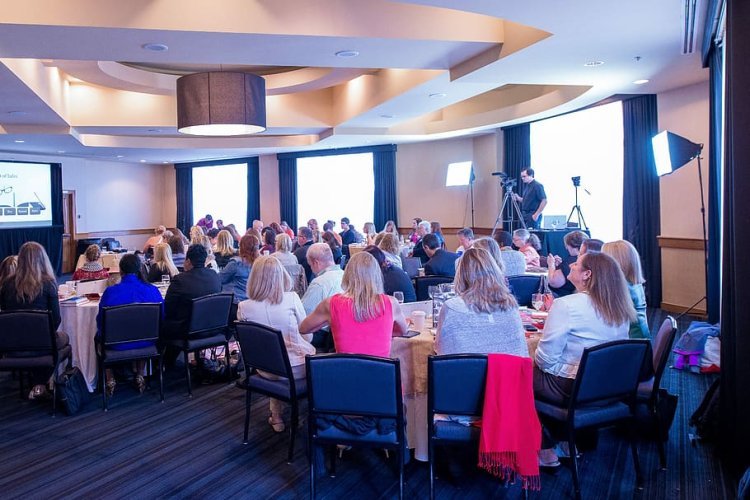7 B2B Event Marketing Ideas for Event Organizers
These seven B2B event marketing ideas will help you effectively promote your event, engage your target audience, and drive attendance.

Marketing a B2B event requires a focused strategy to attract the right audience and ensure a successful turnout. These seven B2B event marketing ideas will help you effectively promote your event, engage your target audience, and drive attendance.
1. Create an Engaging Event Website
An event website serves as the primary source of information for potential attendees and should be both informative and engaging.
Action Steps:
- Highlight Essential Information: Clearly present dates, location, agenda, speaker bios, and registration details.
- Use Compelling Visuals: Incorporate high-quality images, videos, and testimonials from previous events to capture interest.
- Optimize for Search Engines: Use relevant keywords to improve SEO and attract organic traffic.
- Ensure Mobile Compatibility: Make sure your website is mobile-friendly to accommodate users accessing it on their phones or tablets.
2. Utilize LinkedIn for Professional Outreach
LinkedIn is an ideal platform for B2B event marketing due to its professional user base.
Action Steps:
- Create an Event Page: Set up an event page on LinkedIn to centralize information and updates.
- Join Relevant Groups: Participate in LinkedIn groups related to your industry and share event updates.
- Share Content Regularly: Post about speaker announcements, session highlights, and other relevant updates to keep your audience engaged.
- Use Sponsored Content: Utilize LinkedIn’s sponsored content options to reach a broader audience.
3. Implement Targeted Email Marketing
Email marketing allows you to reach potential attendees directly with personalized messages and updates.
Action Steps:
- Segment Your Email List: Divide your list into segments based on industry, job title, and past attendance.
- Personalize Your Emails: Address recipients by name and tailor content to their specific interests and needs.
- Plan a Series of Emails: Send a sequence of emails, including save-the-date notices, registration reminders, and speaker spotlights.
- Include Clear Calls to Action: Make it easy for recipients to register, learn more, or share the event with their network.
4. Leverage Content Marketing
High-quality content can attract potential attendees and keep them engaged leading up to your event.
Action Steps:
- Write Blog Posts: Publish articles about industry trends, speaker interviews, and event highlights on your website.
- Create Videos: Produce promotional videos, speaker introductions, and behind-the-scenes footage to share on social media and your website.
- Use Infographics: Design infographics to visually present key information about your event, such as the agenda and benefits of attending.
- Share Testimonials: Post testimonials from past attendees and exhibitors to build credibility and encourage new registrations.
5. Offer Early Bird Discounts
Early bird discounts can incentivize attendees to register early and create buzz around your event.
Action Steps:
- Set a Limited-Time Offer: Create urgency by offering a discount for a limited period before the event.
- Promote the Discount: Highlight the early bird offer on your website, social media, and email campaigns.
- Provide Additional Benefits: Offer extra perks like priority seating or exclusive networking opportunities for early registrants.
6. Partner with Industry Influencers
Collaborating with industry influencers can enhance your event’s credibility and expand its reach.
Action Steps:
- Identify Relevant Influencers: Research thought leaders, bloggers, and social media personalities in your industry.
- Engage Influencers Early: Invite them to speak, host sessions, or participate in panel discussions.
- Provide Promotional Support: Equip influencers with promotional materials like pre-written posts and graphics to share with their followers.
- Leverage Their Networks: Encourage influencers to promote your event through their social media channels, blogs, and newsletters.
7. Use Retargeting Ads
Retargeting ads can help you reach people who have shown interest in your event but haven't yet registered.
Action Steps:
- Set Up Retargeting Campaigns: Use platforms like Google Ads and Facebook Ads to create retargeting campaigns aimed at your website visitors.
- Customize Ad Content: Tailor your ads to remind visitors about the event, highlight key benefits, and encourage them to register.
- Monitor and Optimize: Track the performance of your retargeting ads and make adjustments as needed to improve their effectiveness.
By implementing these seven B2B event marketing ideas, event organizers can effectively promote their events, attract the right audience, and create valuable experiences for attendees. Continuously evaluate and refine your marketing strategies based on feedback and performance metrics to ensure ongoing success and improvement.
What's Your Reaction?











![Wireless Connectivity Software Market Size, Share | Statistics [2032]](https://handyclassified.com/uploads/images/202404/image_100x75_661f3be896033.jpg)




